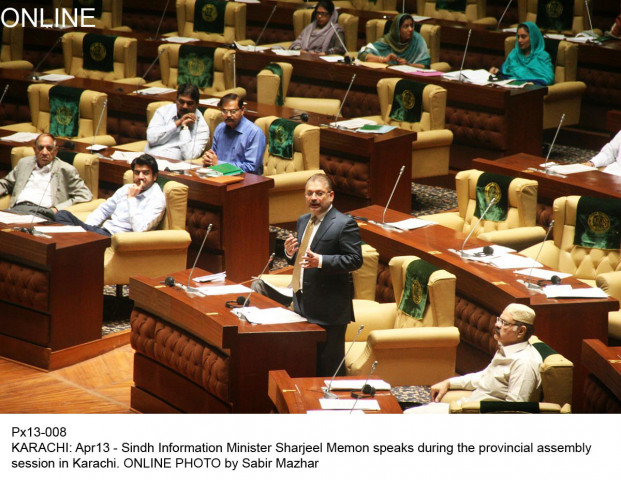Sindh govt to set up Thar, Kohistan development authorities
Organisations will work for development, improvement of drought-hit areas.

Both the bills have been included in the agenda of the Sindh Assembly session scheduled to resume on Monday.. PHOTO: ONLINE
According to the draft copies of the bills available with The Express Tribune, both authorities will function in a similar manner and will be chaired by the local government minister. The members will include the local government secretary, one member of the provincial assembly to be nominated by the government, a representative of the public health engineering department, directors-general of the Thar and Kohistan development authorities, a technocrat and members of civil society.
“The residents of these areas have been facing a severe drought since the last several years,” explained the minister for parliamentary affairs, Dr Sikandar Mandhro. “These authorities will be responsible for the overall development in the areas by formulating, implementing and enforcing schemes.” The authorities will not only look after development but will also coordinate with the federal and provincial governments on various issues.
The bill reads that the development authorities will provide, develop, operate and maintain public works relating to water supply, drainage, sewerage and disposal of solid waste. “Capacity building of the residents will be enhanced by conducting training programmes and seminars on planning and development,” states the proposed law, adding that the authorities will acquire properties (moveable or immoveable) and can dispose any land or other property vested in it by sale, lease, exchange or otherwise. The bill also gives the authorities the power to declare any site a controlled area and issue directions for the prevention of haphazard growth, encroachments, unauthorised construction or operation in the area. “No person can erect any building, make any material alteration to an existing building or construct or reconstruct any projecting portion,” says the bill.
With regards to development plans, the bill says that the authorities will prepare the master plan for development and improvement in their areas. “On the request of the local council, provincial government and federal government, the development authorities may assist them in various schemes, such as public buildings, schools, colleges, libraries and hospitals,” said the local government minister, Sharjeel Inam Memon. He added that for the execution of any scheme, the development authorities may demolish any building after paying compensation to its owners.
Memon explained that after the passage of the law, the Thar and Kohistan development authorities will be able to purchase, lease or acquire any land or building by entering into an agreement with the owners of the properties.
While the opposition parties have welcomed the government’s decision to establish the authorities, their representatives stressed the need to implement the law in letter and spirit. “Instead of getting relief, people have suffered after the establishment of the Malir, Lyari and Sehwan development authorities, which have failed to deliver,” said Pakistan Muslim League — Nawaz parliamentary leader Haji Shafi Jamote.
Published in The Express Tribune, April 26th, 2015.



















COMMENTS
Comments are moderated and generally will be posted if they are on-topic and not abusive.
For more information, please see our Comments FAQ